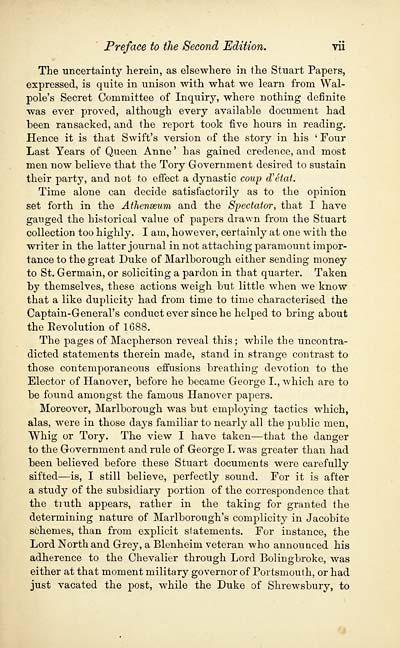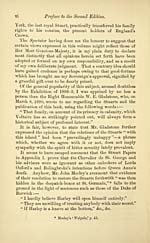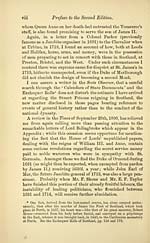Stuart dynasty
(13) Page vii
Download files
Complete book:
Individual page:
Thumbnail gallery: Grid view | List view

Preface to the Second Edition. vii
The uncertainty herein, as elsewhere in the Stuart Papers,
expressed, is quite in unison with what we learn from Wal-
pole's Secret Committee of Inquiry, where nothing definite
was ever proved, although every available document had
been ransacked, and the report took five hours in reading.
Hence it is that Swift's version of the story in his ' Four
Last Years of Queen Anne ' has gained credence, and most
men now believe that the Tory Government desired to sustain
their party, and not to effect a dynastic coup d'etat.
Time alone can decide satisfactorily as to the opinion
set forth in the Athenseum and the Spectator, that I have
gauged the historical value of papers drawn from the Stuart
collection too highly. I am, however, certainly at one with the
writer in the latter journal in not attaching paramount impor-
tance to the great Duke of Marlborough either sending money
to St. Germain, or soliciting a pardon in that quarter. Taken
by themselves, these actions weigh but little when we know
that a like duplicity had from time to time characterised the
Captain-General's conduct ever since he helped to bring about
the Revolution of 1688.
The pages of Macpherson reveal this ; while the uncontra-
dicted statements therein made, stand in strange contrast to
those contemporaneous effusions breathing devotion to the
Elector of Hanover, before he became George I., which are to
be found amongst the famous Hanover papers.
Moreover, Marlborough was but employing tactics which,
alas, were in those days familiar to nearly all the public men,
Whig or Tory. The view I have taken — that the danger
to the Government and rule of George I. was greater than had
been believed before these Stuart documents were carefully
sifted — is, I still believe, perfectly sound. For it is after
a study of the subsidiary portion of the correspondence that
the truth appears, rather in the taking for granted the
determining nature of Marlborough's complicity in Jacobite
schemes, than from explicit statements. For instance, the
Lord North and Grey, a Blenheim veteran who announced his
adherence to the Chevalier through Lord Bolingbroke, was
either at that moment military governor of Portsmouth, or had
just vacated the post, while the Duke of Shrewsbury, to
The uncertainty herein, as elsewhere in the Stuart Papers,
expressed, is quite in unison with what we learn from Wal-
pole's Secret Committee of Inquiry, where nothing definite
was ever proved, although every available document had
been ransacked, and the report took five hours in reading.
Hence it is that Swift's version of the story in his ' Four
Last Years of Queen Anne ' has gained credence, and most
men now believe that the Tory Government desired to sustain
their party, and not to effect a dynastic coup d'etat.
Time alone can decide satisfactorily as to the opinion
set forth in the Athenseum and the Spectator, that I have
gauged the historical value of papers drawn from the Stuart
collection too highly. I am, however, certainly at one with the
writer in the latter journal in not attaching paramount impor-
tance to the great Duke of Marlborough either sending money
to St. Germain, or soliciting a pardon in that quarter. Taken
by themselves, these actions weigh but little when we know
that a like duplicity had from time to time characterised the
Captain-General's conduct ever since he helped to bring about
the Revolution of 1688.
The pages of Macpherson reveal this ; while the uncontra-
dicted statements therein made, stand in strange contrast to
those contemporaneous effusions breathing devotion to the
Elector of Hanover, before he became George I., which are to
be found amongst the famous Hanover papers.
Moreover, Marlborough was but employing tactics which,
alas, were in those days familiar to nearly all the public men,
Whig or Tory. The view I have taken — that the danger
to the Government and rule of George I. was greater than had
been believed before these Stuart documents were carefully
sifted — is, I still believe, perfectly sound. For it is after
a study of the subsidiary portion of the correspondence that
the truth appears, rather in the taking for granted the
determining nature of Marlborough's complicity in Jacobite
schemes, than from explicit statements. For instance, the
Lord North and Grey, a Blenheim veteran who announced his
adherence to the Chevalier through Lord Bolingbroke, was
either at that moment military governor of Portsmouth, or had
just vacated the post, while the Duke of Shrewsbury, to
Set display mode to:
![]() Universal Viewer |
Universal Viewer | ![]() Mirador |
Large image | Transcription
Mirador |
Large image | Transcription
Images and transcriptions on this page, including medium image downloads, may be used under the Creative Commons Attribution 4.0 International Licence unless otherwise stated. ![]()
| Histories of Scottish families > Stuart dynasty > (13) Page vii |
|---|
| Permanent URL | https://digital.nls.uk/94817922 |
|---|
| Description | A selection of almost 400 printed items relating to the history of Scottish families, mostly dating from the 19th and early 20th centuries. Includes memoirs, genealogies and clan histories, with a few produced by emigrant families. The earliest family history goes back to AD 916. |
|---|

